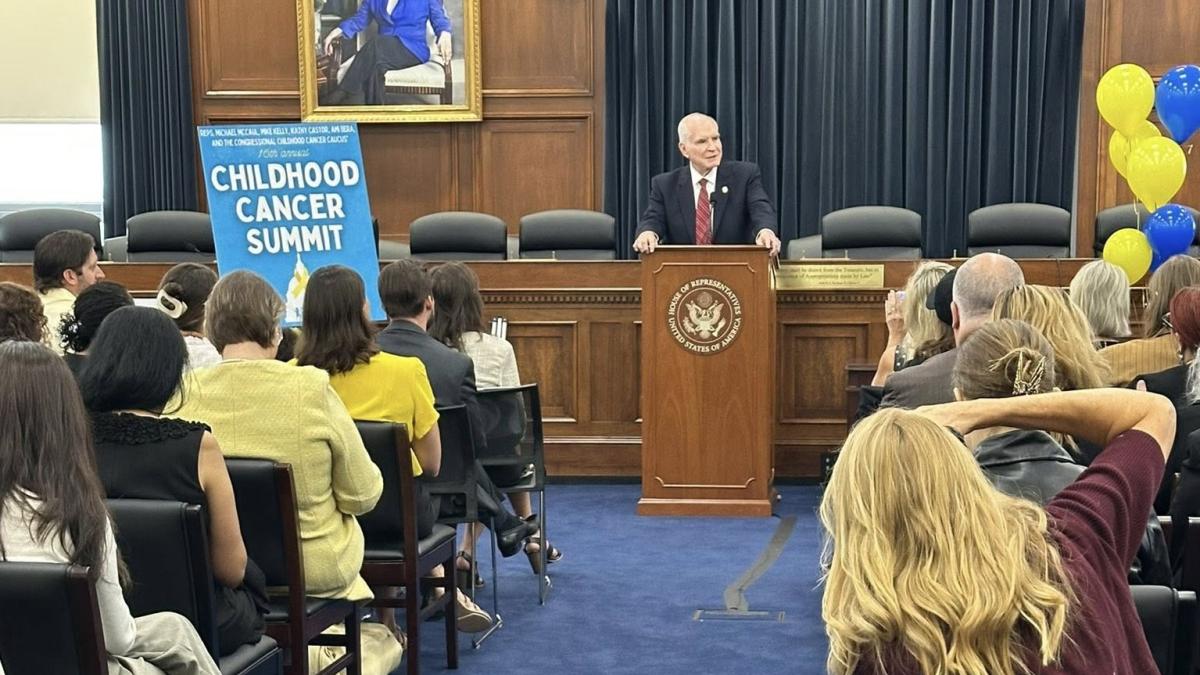Kelly, Colleagues Lead Bipartisan Reform to Address Underfunding of Pediatric Cancer Research

WASHINGTON, D.C. – This week, U.S. Representative Mike Kelly (PA-16), Co-Chair of the Congressional Childhood Cancer Caucus, joined Congressman Brian Fitzpatrick (PA-01) and a bipartisan coalition of lawmakers in introducing the Fairness to Kids with Cancer Act of 2025, legislation that ensures federal cancer research funding for pediatric cancers aligns with the percentage of Americans under 18.
Lawmakers co-leading the legislation with Reps. Kelly and Fitzpatrick are Dwight Evans (PA-03), Elise Stefanik (NY-21), Josh Gottheimer (NJ-05), and Susie Lee (NV-03).
Despite nearly one-fifth of Americans age 18-under, pediatric cancers receive only about 4% of federal cancer research funding. Childhood cancer remains the leading disease-related cause of death for children in the United States, yet many treatments still rely on therapies developed for adults decades ago.
“Approximately 16,000 children are diagnosed with cancer in the United States each year. This legislation invests more in the discovery of treatments and cures that work for these courageous children,” said Rep. Kelly, Co-Chair of the Congressional Childhood Cancer Caucus. “The Fairness to Kids with Cancer Act is a giant step toward that goal because it focuses more money on childhood cancer research. We can, and should, do more, which is why I am a proud champion of this bill.”
“This bill is rooted in a simple principle: fairness. Pediatric cancer has been chronically underfunded for decades, leaving families with fewer options and slower innovation,” said Rep. Fitzpatrick. “The Fairness to Kids with Cancer Act rights a fundamental imbalance, accelerates discovery, and ensures we invest in cures designed for the courageous children who do not choose this battle but fight it with a strength few adults could ever imagine.”
“Cancer can be so devastating at any age, and it can be especially difficult for kids diagnosed with it and their families," said Rep. Evans. "I’m proud to cosponsor this bill from my Pennsylvania colleague that would help ensure an equitable amount of federal funding for pediatric cancer research.”
“No parent or child should have to face the pain of pediatric cancer. Unfortunately, underinvestment in research and treatment has meant that Nevada kids often must wait or travel several hours for treatment or potentially lifesaving clinical trials,” said Rep. Lee. “I’m proud to help lead this bipartisan legislation with Rep. Fitzpatrick to ensure that federal funding is properly allocated to match our children’s health needs. Our children deserve access to the best care possible, no matter where they live.”
“Cancer is an awful disease that’s devastating so many American children and families — unnecessarily cutting precious lives short. We must keep taking every possible step toward finding cures. That’s why I’m proud to co-lead the bipartisan Fairness to Kids with Cancer Act, to help ensure that federal investments are equally distributed to pediatric cancer research,” said Rep. Gottheimer. “There are children behind every statistic. Pediatric cancer touches far too many families, including my own. With the Fairness to Kids with Cancer Act, we will help develop cutting-edge treatments, find cures, and, most importantly, save lives.”
The legislation establishes:
- Fair-Share Funding Requirement: Beginning in FY2026, pediatric cancer research funding must match the percentage of Americans under age 18.
- Data-Driven Allocation: Annual funding levels will use official Census data.
- Sustained National Investment: Ensures long-term, stable federal support for child-specific treatments.
BACKGROUND
Rep. Kelly has long been a champion for pediatric cancer families, using his role on the Congressional Childhood Cancer Caucus to elevate the voices of young patients, survivors, and caregivers in Pennsylvania and across the nation.
Most recently, Rep. Kelly introduced a resolution to recognize Rare Cancer Day, to highlight the challenges patients face, and to unify individuals living with rare cancers for awareness and early diagnosis. Approximately 1 in 5 Americans living with cancer are diagnosed with a rare cancer.